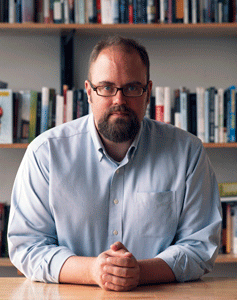An interview with
Alex Steffen
Executive Editor of Worldchanging
Alex Steffen has been the Executive Editor of Worldchanging since he co-founded the organization in 2003. Steffen is the author of “World Changing: A User’s Guide to the 21st Century” (Abrams, 2006), a 600-page compendium of leading solutions from around the world.
Prior to founding Worldchanging, Steffen worked as an environmental journalist on four continents. That work led him to provide strategic consultation to over 50 environmental groups (on issues like the fate of endangered species, the future of “smart growth” and “reframing” the environmental movement) and many foresight projects (anticipating, for instance, paths for a Pacific Northwest transition to sustainability, what green neighborhoods of the future might look like, and how to prevent the next use of nuclear weapons).
Steffen met up with Stephen Beard from American Public Media in Copenhagen. On the radio show Marketplace, the two discussed our favourite solution for fighting climate change: reinventing cities.
Making cities more compact and walkable can drastically cut greenhouse gas emissions and make it easier for citizens to share information, resources and services. And lacing those cities with smart technology can give invisible systems, like water and energy use, the transparency necessary to encourage high levels of conservation.
Most of the hard work building a low-carbon economy and lifestyle is going to be done in local communities. Commentator Alex Steffen says more than ever, acting globally means acting locally.
Alex Steffen: How do we fight climate change?
Most of us have heard of engineering fixes, like swapping coal plants and SUVs with wind turbines and hybrid cars. Clean energy and green tech are critical, but they’re being eclipsed by a more system-wide approach: building bright green cities. Cities offer us powerful leverage on our most stubborn, wasteful practices. Long commutes in our cars, big power bills from our energy-hogging buildings, shopping trips to buy stuff that’ll spend a few short months in our homes and long centuries in our landfills.
These are unsustainable behaviours. And they’re so difficult to change because they’re spun into the very fabric of our cities and sprawling suburbs. Reweave that fabric, and we find change much easier.
For example: start building homes together, in compact, walk-able neighborhoods, and suddenly, people don’t drive as much. Upgrade our energy systems with high-tech monitoring, and people start living radically more energy-efficient lives by default, rather than exception.
Innovations like zero-energy buildings and post-ownership consumption sound complicated, but in reality, they’re meaning is simple: We now know how to deliver a higher standard of living with dramatically lower ecological impacts. The future of cities can be both bright and green.
And that’s critical, because the world is building cites faster than ever. Billions of young people are leaving their villages, seeking better lives in the emerging mega-cities of the global south. If we can’t find a way to meet their needs, sustainably, no climate treaty will help us. But if we in the global north can reinvent our cities, we will not only slash our own pollution, but provide a pathway to sustainable prosperity for the rest of the world, too. And that, in turn, means markets for these innovations and billions of new customers.
Develop bright green urban solutions and we may not only save the planet, but find the 21st century’s best business opportunities in the bargain.
Kai Ryssdal: As our man in Copenhagen, Stephen Beard, told us, there was a whole lot more going on at the climate summit than just a bunch of people sitting around talking policy. There are protests and skeptics and side conferences, too. One of the bigger sideline events is a meeting of mayors from around the world early next week. Because whatever global deal does or doesn’t get done in Copenhagen, a lot of the really hard work is going to happen on a much more micro level, in state and provinces and cities and towns. Commentator Alex Steffen says now more than ever, acting globally means acting locally.
Note</em>
This interview has been printed in tbl with permission from Worldchanging.com, a nonprofit media organization which comprises a global network of independent journalists, designers and thinkers. The audio recording of the interview with Alex Steffen can be accessed at the American Public Media website:






